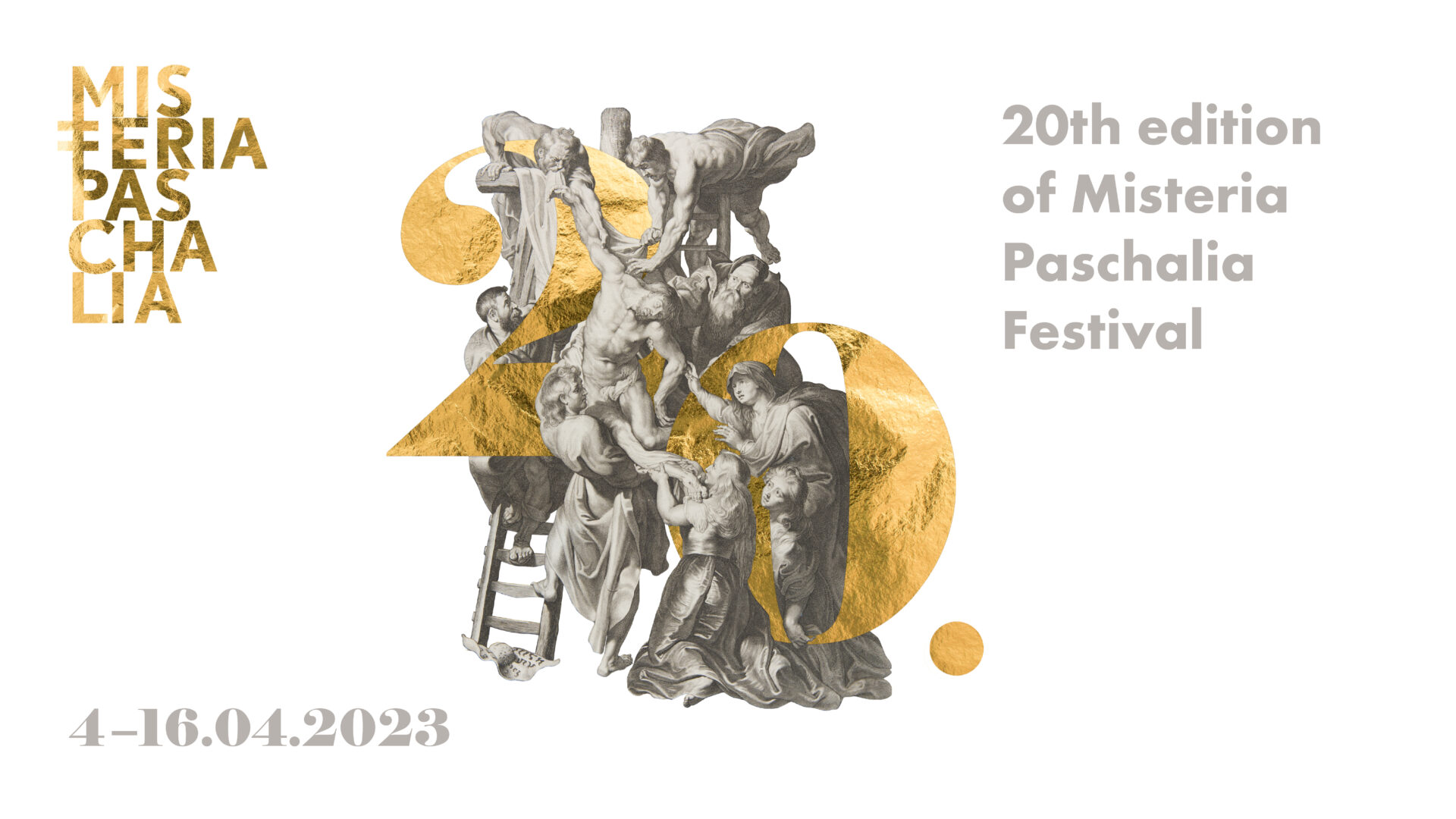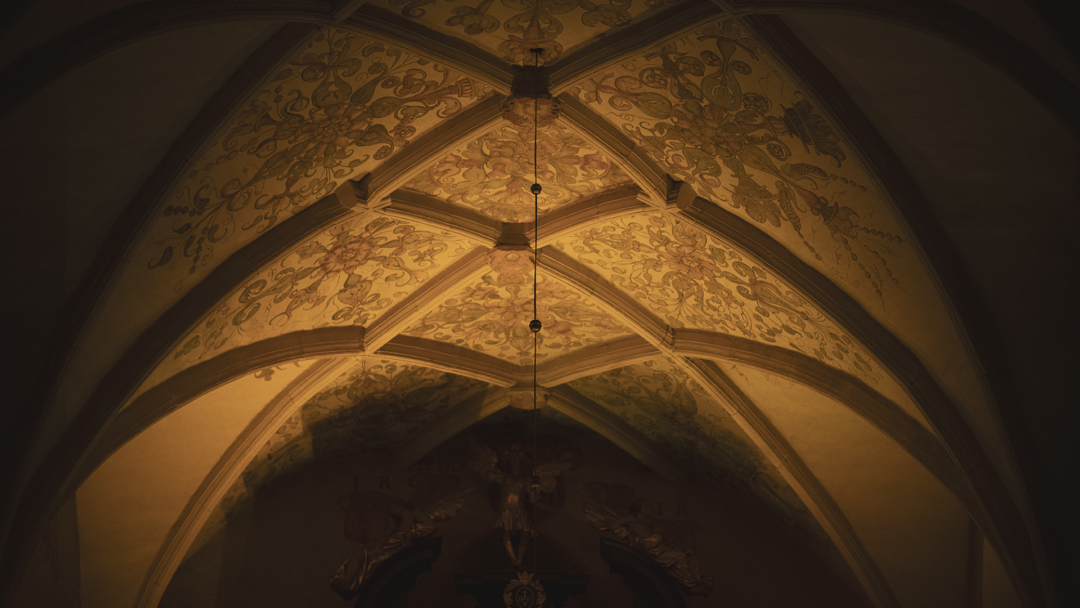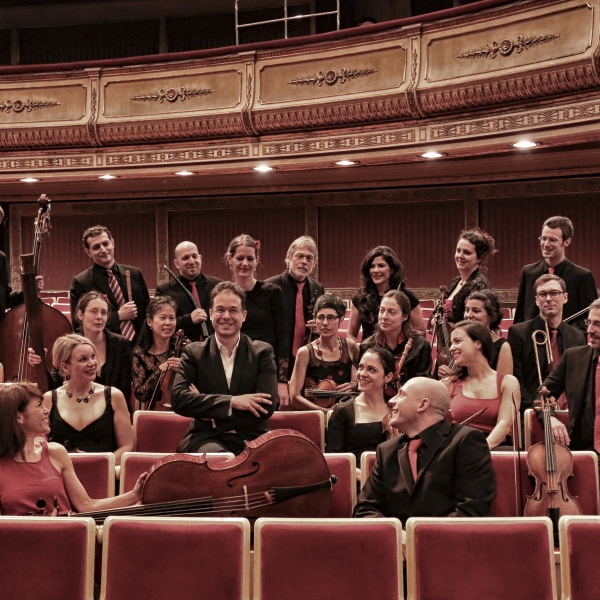Return to the Sources. Misteria Paschalia Festival 2022
Misteria Paschalia has been discovering and presenting compositions linked with Holy Week and Easter for many years. The festival continually evolves by inviting a new director-in-residence each year. Their different experiences and interests mean that every festival is unlike the previous, and we can experience events surrounding Easter with a fresh perspective.
To make sure this happens, we need established, experienced artists with a clear vision of what they want to express through the medium of early music. This year’s director-in-residence is Martyna Pastuszka – violinist and co-founder and leader of the {oh!} Orkiestra Historyczna ensemble. While past editions of the festival focused on music from selected regions of Europe, she doesn’t pick a geographical destination but takes us on a journey deep into ourselves. She has selected works representing myriad styles and periods, from the Middle Ages to Classicism, which explore Biblical events and tell a universal story reflecting the human path of change: from falling, via tragedy, trauma and denial, to acceptance and starting anew. And the music doesn’t just illustrate this path – it accompanies and supports us even in our darkest moments.
12 April 2022, Holy Tuesday. The festival opens with a concert resounding with psalms from Mikołaj Gomółka’s Melodies for the Polish Psalter. This unique collection was written as a musical setting for Jan Kochanowski’s David’s Psalter, and was first printed just a year after the original poem. Gomółka wrote a rhymed dedication to the Bishop of Kraków Piotr Myszkowski, explaining that the psalms are intended for “our own simple populace”. This seems to be an exaggeration: since his psalms are only superficially simple, featuring elaborate ornamentation, changing rhythms and requiring a wide range, it is unlikely they could have been performed by amateur vocalists. The psalms, including seven focusing on penitence, will be sung by the Polish Radio Choir under the baton of Agnieszka Bennett-Budzińska – singer, harpist and expert in early music practice, ready to take up the challenge of adapting this jewel of Polish Renaissance.
13 April 2022, Holy Wednesday. Davide penitente is a rarely performed and discussed work by Wolfgang Amadeus Mozart. The cantata was commissioned by the Tonkünstler-Societät in Vienna and, despite its religious nature, it was first performed at the Burgtheater – the venue which staged the premiere of The Marriage of Figaro just a year later. The libretto features texts from the Book of Psalms and the First Book of Samuel, describing different stages of our relationship with God: from repentance and pleading for forgiveness to reconciliation and joyful worship. The composer borrowed some material from his better-known, unfinished Mass in C-minor, but he also composed several new pages. The concert opens with Niccolò Jommelli’s Miserere in G-minor written a few years before Mozart’s birth, and one of Mozart’s best-known later works: Symphony no. 40 in G-minor. We will hear the {oh!} Orkiestra Historyczna ensemble under the baton of Martyna Pastuszka and the Vox Luminis XL choir led by Lionel Meunier.
14 April 2022, Maundy Thursday. Gesù Cristo negato da Pietro is an oratorio in which allegorical figures engage in a theological dispute on Peter’s denial of Jesus – one of the most psychologically captivating parts of the Gospels. It was written by Johann Joseph Fux, best remembered as an author of a treatise on counterpoint. His sacred compositions, including dramatic oratorios for Holy Week (when staging of operas was prohibited), reveal a great flair for theatre. At Misteria Paschalia this theatrical element is brought out even further in the interpretation presented by Gunar Letzbor with the Ars Antiqua Austria ensemble.
15 April 2022, Good Friday. Alessandro Scarlatti’s St. John Passion is very different from the more widely-known work of the same title by J.S. Bach. In contrast to the Lutheran Bach, Scarlatti wrote it for Catholic liturgy. And yet Scarlatti, author of around 60 operas, is far more restrained than Bach: his version of the passion is short and concise, filled with austere depth and free from arias. Another major difference is giving the part of the Evangelist to an alto instead of a tenor. We will hear Giuseppina Bridelli in this expressive role, while festival favourite Leonardo García Alarcón leads the Cappella Mediterranea and Choeur de Chambre de Namur ensembles.
16 April 2022, Easter Saturday. Anna Danilevskaia, violinist specialising in vielle, takes us on a trip to mid-14th century Florence with the Sollazzo Ensemble. Although the Black Death brought devastation to the city and decimated its population, artistic creativity continued to flourish as it served as a means of escape from the terrifying reality. The exquisite texts of songs and madrigals show no trace of the tragic circumstances of the time. This was also the time when Giovanni Bocaccio wrote his Decameron, in which a group of ten young men and women take shelter from the Black Death in a villa in the hills surrounding Florence. Isolated from the world and its troubles, they spend their time in the garden telling stories and playing music. The concert by the Sollazzo Ensemble serves as a metaphorical musical garden, bringing us solace at our own time of unease.
17 April 2022, Easter Sunday. Joseph Haydn’s Symphony no. 49 “La Passione” is a symbolic work serving as a bridge between the contemplation and tragedy of Holy Week turning into joy and optimism of the Resurrection. And we will hear more joy in Mozart’s truly “sunny” works: the Exsultate, jubilate motet for soprano (Florie Valiquette) and Symphony no. 41 “Jupiter” – the composer’s last. We will hear the acclaimed French orchestra Le Concert de la Loge under the baton of the violinist Julien Chauvin.
18 April 2022, Easter Monday. The festival closes with a contemporary premiere of Jacob Schuback’s oratorio Die Jünger zu Emaus, written in 1778. The composer was also a lawyer and archivist, and an important member of Hamburg’s musical circles. His composition describes an encounter between Jesus and two disciples on their way to Emmaus. It will be performed by artists-in-residence of the 19th Misteria Paschalia Festival, the {oh!} Orkiestra Historyczna ensemble, joined by the Polish Radio Choir, all led by Martyna Pastuszka.
Tickets and festival passes will be available for sale from February 25, 2022 from 12.00 on the kbfbilety.krakow.pl at InfoKraków points and on the eventim.pl portal. Free tickets for the concert taking place on April 12, 2022 will be available for download from March 29.
Festival passes will cover all concerts during the festival, with the exception of the concert taking place in the “Wieliczka” Salt Mine. People who purchase the pass have the priority to get a free ticket to the concert that will take place on April 12, 2022 at the Wawel Cathedral.
From November 22, 2021, the Daniłowicz shaft in the “Wieliczka” Salt Mine is being renovated and closed for tourist traffic, and the descent to the mine is via the Paderewski shaft, which does not have a working lift right now. The concert in Wieliczka will be unavailable for people with physical disabilities.
More news

Misteria Paschalia 2025 – here’s the programme!
Eight days, ten special locations and dozens of artistic events in Kraków, Tyniec and Wieliczka between 13 and 20 April 2025: that’s this year’s 22nd edition of the Misteria Paschalia Festival, one of Europe’s most important early music festivals, in a nutshell! Artistic director Vincent Dumestre takes the audience on a unique journey through music […]
read more
Keybord Days – apply for a masterclass and improvisation workshop!
Keyboard Days – a three-day celebration of keyboard instruments – include not only an exhibition and recitals but also masterclasses, improvisation workshops and panels. These events form the educational part of the Misteria Paschalia Festival. Masterclasses to be conducted by Jean-Luc Ho, Justin Taylor and Pierre Hantaï are addressed to students and graduates of music […]
read more
Misteria Paschalia 2024. Showcasing the programme of one of the most important early music festivals in Europe.
Eight days, ten locations, dozens of events… This year, the artistic direction of the Misteria Paschalia Festival was entrusted to Vincent Dumestre, who is already very well known among audiences in Krakow as the founder, artistic director and conductor of Le Poème Harmonique ensemble, whose concerts have been highly anticipated by festival audiences for many […]
read more
Anniversary edition of Misteria Paschalia! Explore the festival programme | 4–16 April 2023
In the coming year, we will enjoy the special 20th edition of Misteria Paschalia, which will provide an opportunity for a reminiscence journey into the past. The programme will focus on celebrating the festival’s history, its contribution to the development of the early music sector in Poland and the extraordinary bonds that have been forged […]
read more
Return to the Sources. Misteria Paschalia Festival 2022
Misteria Paschalia has been discovering and presenting compositions linked with Holy Week and Easter for many years. The festival continually evolves by inviting a new director-in-residence each year. Their different experiences and interests mean that every festival is unlike the previous, and we can experience events surrounding Easter with a fresh perspective. To make sure […]
read more
Early Mmusic Day
For the last nine years, the first day of spring has coincided with Early Music Day. The symbolic date is no accident, since it marks the birthday of J.S. Bach. The REMA European Early Music Network has established the event as a celebration of European music of the Middle Ages, Renaissance and the Baroque. This […]
read more
Misteria Paschalia Festival
One of the most important early music festivals in Europe, Misteria Paschalia is held every year during Holy Week. Held for the 18th time, this year’s festival is a continuation of the journey through Europe launched in 2017. This time, Misteria Paschalia’s perambulations take us even further afield, exploring the music and culture of the Iberian […]
read more
